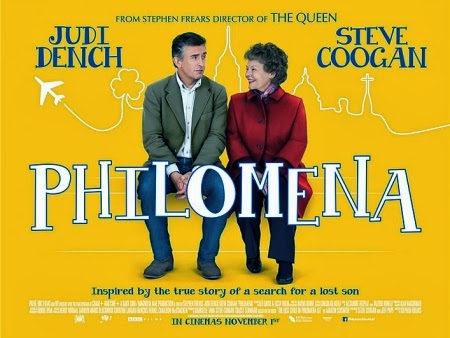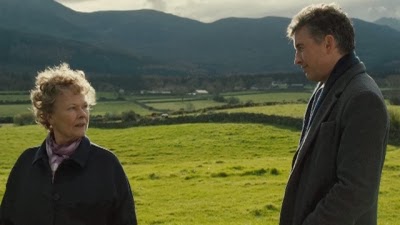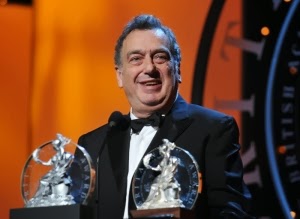
WHO WROTE IT - British comic Steve Coogan is best known in the UK as Alan Partridge, a fake talk-show host often compared to Stephen Colbert and co-created by Coogan with fellow future Oscar-nominated screenwriters Armando Iannucci (In the Loop) and Patrick Marber (Notes on a Scandal).

Although less known in the US, Coogan has appeared in such Hollywood hits as Tropic Thunder, both Night at the Museum movies, and as the voice of Silas Ramsbottom in Despicable Me 2, as well as indie darlings 24 Hour Party People, Hamlet 2, Ruby Sparks, and the aforementioned Oscar-nominated In the Loop.
The source material, the book The Lost Child of Philomena Lee: A Mother, Her Son and a Fifty-Year Search by Martin Sixsmith, was published in 2009. Sixsmith was a BBC correspondent, a novelist, and an advisor on In the Loop. In 2004, he was approached by a stranger at a party who asked him to help a friend’s mother solve a fifty-year-old mystery.
He spent the next five years helping the feisty, old Irishwoman track down her lost son. His book shared the deepest secrets of Lee’s youth and reconstructed the life of the child she never got to see grow up.
 |
| (l-r) Author Martin Sixsmith, Philomena Lee, screenwriter Steve Coogan |
Coogan is one of thirteen screenwriters last year who starred in the films they wrote or co-wrote, including Ethan Hawke and Julie Delpy, also nominated in the Best Adapted Screenplay category for Before Midnight.
 |
| Screenwriters Jeff Pope (l) and Steve Coogan (r) with Judi Dench |
Coogan was attracted to the incongruity of the cynical Sixsmith going on a journey of discovery with this woman who appeared carefree in the face of deep personal tragedy. He saw a way to tackle a serious subject with humor and put his two characters on the road together, not unlike Best Original Screenplay nominee Nebraska, even though Sixsmith and Lee never traveled to America together during their real life search.
The co-protagonists have opposing world views -- he’s secular, she retains her faith to this day -- and each has a complete arc without either having a phony revelation that transforms them.

Despite their differences, the two main characters are not each other’s antagonist. The villain is the “obstructive Catholic church,” as Sixsmith describes it, personified in Sister Hildegarde (who, in reality, had died before their search began). The movie almost plays as a direct sequel to 2002’s The Magdalene Sisters.
The film’s villain appears as an obstructive force only in the first and third acts. The second act journey that makes up the bulk of the film has an external goal -- finding Philomena’s son -- that completely changes after a surprising midpoint catapults the story into a new direction.
WILL IT WIN - Philomena has many of the elements Oscar voters respond to: Controversial subject matter (bringing to light a little-known scandal kept tightly under wraps by the Catholic church), LGBT themes, and Judi Dench.
With four total nominations, including Best Picture and Best Actress (Dench), it’s The Weinstein Company’s most nominated film. Known as an aggressive Oscar campaigner who steered voters away from Fargo in favor of The English Patient and pushed a win on Shakespeare in Love over Saving Private Ryan, The Hollywood Reporter expects Harvey Weinstein to pull out all the stops.
 |
| PHILOMENA director Stephen Frears |
Dench, who won in 1999 for Shakespeare in Love, is on her seventh nomination, while composer Alexandre Desplat is up for his sixth at-bat in eight years with no wins.
Philomena seems destined to take home the gold for something, and it just might be its screenplay, which placed first at the Venice Film Festival and was nominated for a Golden Globe, BAFTA, Critics’ Choice, and USC Scripter Award, and two ScripTipps Platinum Brad Screenplay Awards (Best Screenplay Based on a True Story and Best Screenplay Written or Co-Written by the Film’s Lead Actor).
READ THE SCREENPLAY - The Oscar-nominated Philomena screenplay by Steve Coogan and Jeff Pope can be downloaded directly from The Weinstein Company’s website. (Click here for the PDF.) The final shooting draft is 118 pages, while the finished film clocks in at around 95 minutes.
This is Part 2 of our 10-part series of profiles on this year's Oscar-nominated screenplays.
No comments:
Post a Comment